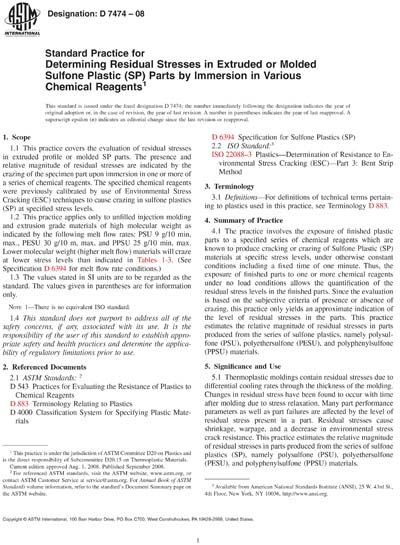Historical
ASTM D7474-08
Standard Practice for Determining Residual Stresses in Extruded or Molded Sulfone Plastic (SP) Parts by Immersion in Various Chemical Reagents
1.1 This practice covers the evaluation of residual stresses in extruded profile or molded SP parts. The presence and relative magnitude of residual stresses are indicated by the crazing of the specimen part upon immersion in one or more of a series of chemical reagents. The specified chemical reagents were previously calibrated by use of Environmental Stress Cracking (ESC) techniques to cause crazing in sulfone plastics (SP) at specified stress levels.
1.2 This practice applies only to unfilled injection molding and extrusion grade materials of high molecular weight as indicated by the following melt flow rates: PSU 9 g/10 min, max., PESU 30 g/10 m, max, and PPSU 25 g/10 min, max. Lower molecular weight (higher melt flow) materials will craze at lower stress levels than indicated in Tables 1-3. (See Specification D 6394
1.3 The values stated in SI units are to be regarded as the standard. The values given in parentheses are for information only.
Note 1—There is no equivalent ISO standard.
1.4 This standard does not purport to address all of the safety concerns, if any, associated with its use. It is the responsibility of the user of this standard to establish appropriate safety and health practices and determine the applicability of regulatory limitations prior to use.
ASTM International [astm]

